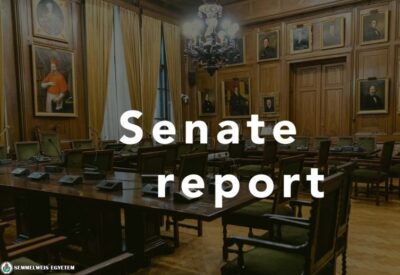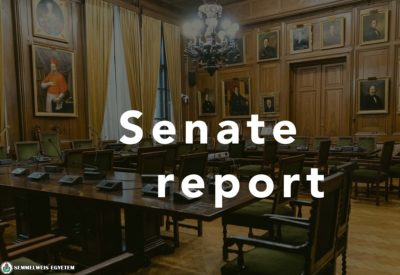At its December meeting, the Senate approved the amendment to the University’s Asset Management Plan for the period 2022-2030, which followed the 2024 review and was justified by changes that occurred in 2024. The amended Asset Management Plan has been extended by two years to 2032, and compared to the previous budget of almost HUF 125 billion, it foresees a budget of HUF 157.7 billion, said Chancellor Lívia Pavlik in her introduction. The development funds are based on three pillars: the yield on the Richter shares, the University’s Strategic Fund, and the public service contract for development – and on investment funds that are periodically tendered on a case-by-case basis. The major projects listed in the Asset Management Plan will continue in 2025 and new investments will be launched as well, such as the construction of EOK 2, the flagship project serving education at the university. A new strategic government project, the Outer Clinical Block (KKT) Masterplan, has been added to the Asset Management Plan, in which the financing of new buildings, amounting to around HUF 136 billion, is planned to be covered by targeted state funding. In the framework of KKT Masterplan, refurbishment of the Department of Surgery, Transplantation and Gastroenterology (STéG), the Department of Neurology, the Department of Urology, and the Department of Otorhinolaryngology, Head and Neck Surgery will be financed from own resources at the end of the time horizon of the Asset Management Plan, which partly justified the prolongation of the plan from 2030 to 2032.
The Senate approved the 2025 Institutional Budget, the concept of which was approved at the November 4 Senate meeting. The main revenue is expected to be almost HUF 300 billion in 2025, compared to HUF 275 billion in 2024. Performance is projected to increase by 6 percent in inpatient care and is expected to remain on the 2024 level in outpatient care. The financial impact of the planned restructuring of health financing is expected to be significant. Education resources will be boosted by a 3-percent increase in the value of the subsidy included in the public service financing contract and by some HUF 3 billion in ranking bonus revenue. Current expenditure is planned at HUF 289 billion, and as part of the investment plan, some HUF 10.5 billion of expenditure will be incurred against the planned revenue, which will also provide the opportunity to create a Strategic Fund of around HUF 4.6 billion. In addition to this, the investment plan foresees an additional HUF 35 billion in investment expenditure, using the above-mentioned resources of the Asset Management Plan, as well as tender funding.
The Senators approved the 2025-2028 Institutional Development Plan, which summarizes the key findings of the situation assessment on which the strategy is based, the mission and vision of the University, the related set of goals, and the actions needed to achieve them. The document highlights the goal of continued development, in the framework of which Semmelweis University aimed to join the top 100 universities in the world by 2030 and to play a leading role in the region. In the period ahead, the focus will remain on growth, but consolidating our achievements, improving quality and excellence, and attracting, integrating, and developing talent will also be considered crucial. We are improving the conditions for theoretical and practical training, building a more attractive and liveable university, strengthening our role in the international arena, the document reads. The Institutional Development Plan will be continuously monitored, with annual reports to the Senate and the Board of Trustees on the progress of actions.
The Senate approved the amendment of the Organizational Rules of the Clinical Center (KK), which serves the harmonization of the tasks and structure of the KK in order to make the organizational structure clearer and more transparent. For example, the amendment establishes the Administrative and Patient Care Unit of the Dental Education Center and the Oral Diagnostic Clinic.
Senators approved changes to the composition of the External Research Assessment Committee and the Committee for the Review of Students’ Judicial Remedy Appeals. They also decided on the next recipient of the Outstanding TDK (Scientific Association of Students) Educator Award.
Amendments to certain provisions of the Organizational and Operational Rules and the Privacy and Disclosure Policy were adopted. From January 1, the allowance for the title of professor emeritus will be increased by 25 percent and a section of the rules governing the appointment of associate professors will be amended. Accordingly, in particularly justified cases and with the rector’s approval, someone may be appointed as an associate professor even if the person does not have at least 10 years of documented undergraduate and/or postgraduate teaching experience, as required by the Regulations, but who fully meets the other criteria for appointment.
Senators were informed about organizational changes below the directorate level.
The board approved the amendment of the Constitution of the Doctoral Students’ Union.
Anita Szepesi
Translation: Judit Szabados-Dőtsch
Illustration by Attila Kovács – Semmelweis University


